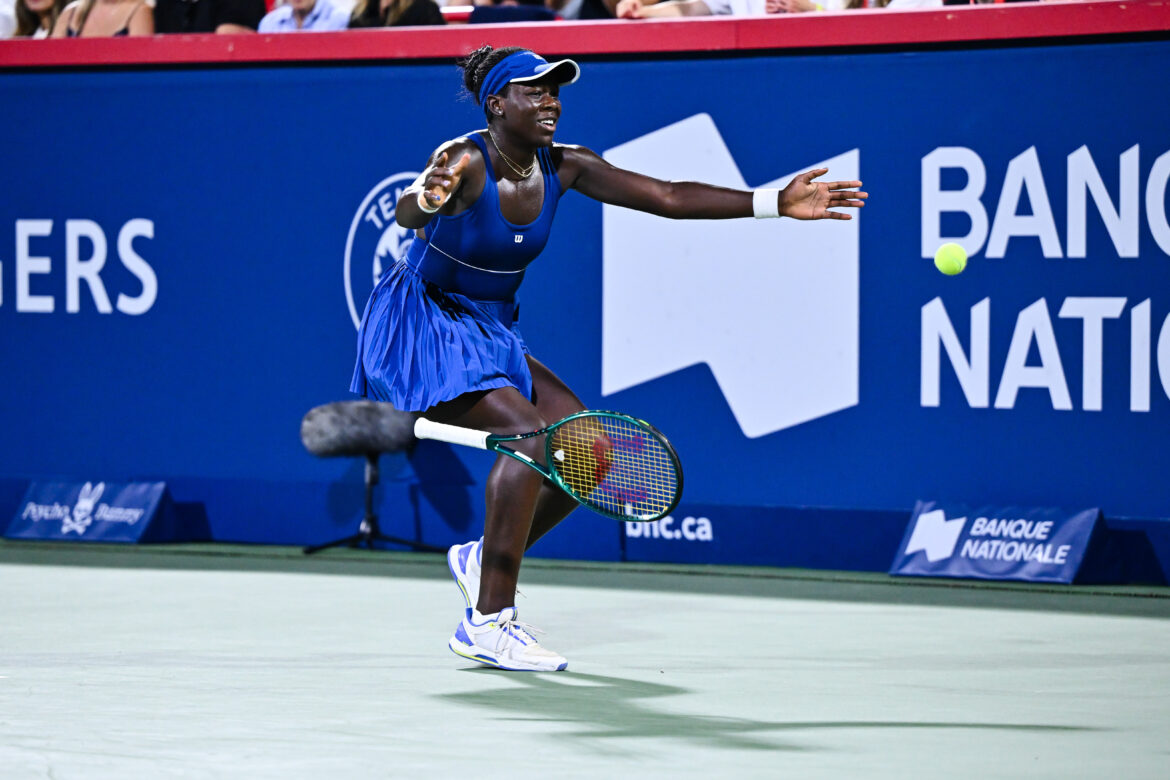Unlikely. Unexpected. Unforeseen. Those words seem to fall far short of explaining what happened in this abbreviated fortnight in Montreal.
Victoria Mboko, an 18-year-old Canadian wild card is the winner of the Omnium Banque Nationale. On Thursday night she completed another rousing comeback, defeating four-time Grand Slam champion Naomi Osaka 2-6, 6-4, 6-1.
It’s the first WTA Tour title for Mboko.
Her fortnight included four victories over Grand Slam champions — Sofia Kenin, Coco Gauff, Elena Rybakina and Osaka. Gauff and Rybakina were seeded No. 1 and No. 3. It’s the first time that’s happened in a single tournament since Ons Jabeur and Elina Svitolina in Wimbledon 2023 — but they weren’t teenagers. Mboko is the second youngest to do it in the entire Open Era. The first was Serena Williams in 1999.
And to think: Mboko started the year ranked No. 333.
“It’s been an incredible week here in Montreal,” Mboko said at the trophy presentation, going on to thank the ball kids, officials and volunteers. “I also want to thank Naomi for an incredible match. I’ve always looked up to her when I was really little, so it’s always great to play with an amazing player like you.”\
“Lastly, I want to thank every single one of you who came to support me throughout this whole week. You guys were incredible, and I couldn’t be more grateful.”
Mboko is only the third Canadian champion at the Canadian Open in the Open Era after Faye Urban in 1969 and Bianca Andreescu în 2019. She’s also only the third wild card to win a WTA 1000 title since the format’s introduction in 2009 after Maria Sharapova (Cincinnati 2011) and Bianca Andreescu (Indian Wells 2019).
It was a wild one, featuring 13 service breaks — in 25 games.
The most telling statistic: Mboko converted eight of nine break points.
There were 32 seeded players in the Canadian Open, but none in this final — for only the third time in the Open Era. For only the sixth time in a WTA 1000. Two players ranked outside the Top 40 of the WTA rankings faced each other in a WTA 1000 final for the first time since the format’s introduction in 2009.
Mboko was a revelation here. Her ranking will soar to No. 34 — up 51 spots.
Both had earlier saved match points, Osaka versus Liudmila Samsonova and Mboko against Elena Rybakina.
The first set was a testament to nerves and, quite possibly, a lingering wrist injury. The 18-year-old Canadian hit two double faults in her opening service game and was broken. Throughout the set, she flexed that heavily taped joint — after falling on it in the semifinals against Rybakina.
Osaka breezed through the first set, never facing a break point and taking advantage of 22 unforced errors.
But in recent days, Mboko has continually shown a sturdy resilience for someone so young. She lost the first set to Marie Bouzkova in the third round before coming back to win in three. She lost the opening set to Rybakina by the same score — and came back to win in a third-set tiebreak.
Mboko broke Osaka’s serve four times in the second set and held a commanding 5-2 lead, but Osaka fought back and narrowed it to 5-4. Despite opening with a double fault (her 12th), Mboko closed it out when another Osaka forehand soared long.
While Mboko scored a break of Osaka’s serve in the third game of the final set, it was the fourth that ultimately proved pivotal.
Mboko fell into a love-30 hole and kept digging out from Osaka’s pressure. In a game that featured six deuces, she saved four break-point bids — and then won it with a cold-hearted drop shot winner, sending the partisan crowd into hysterics.
That made it 4-1 and Mboko backed it up with a hold that ended with an ace and another Osaka forehand into the net.
She broke Osaka for the eight time when a backhand found the net and fell to her knees. The capacity crowd rose to its feet one more time and gave her a sustained ovation.
.


AloJapan.com